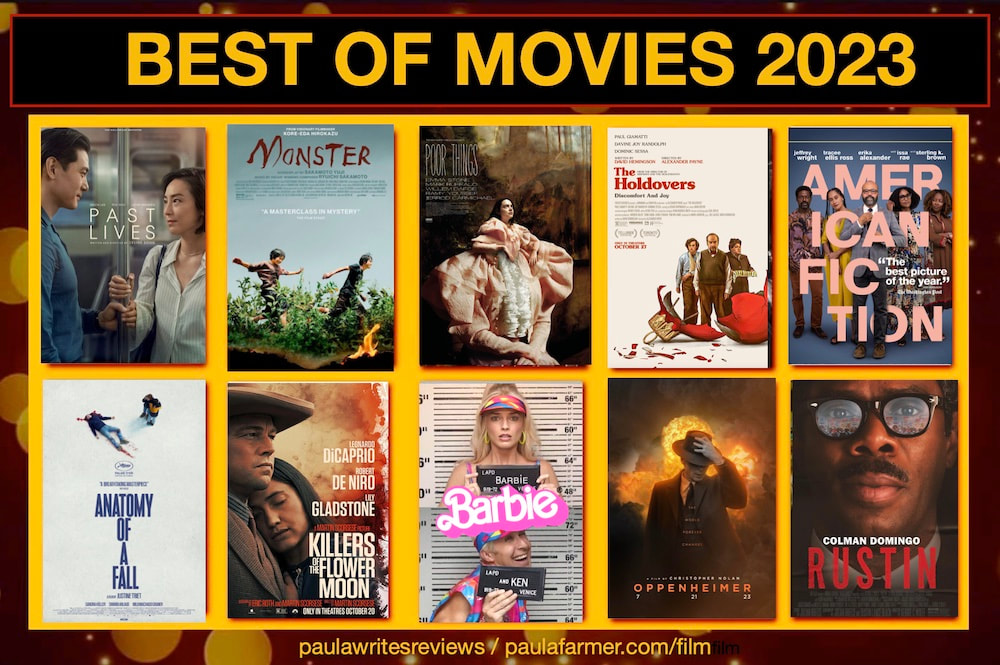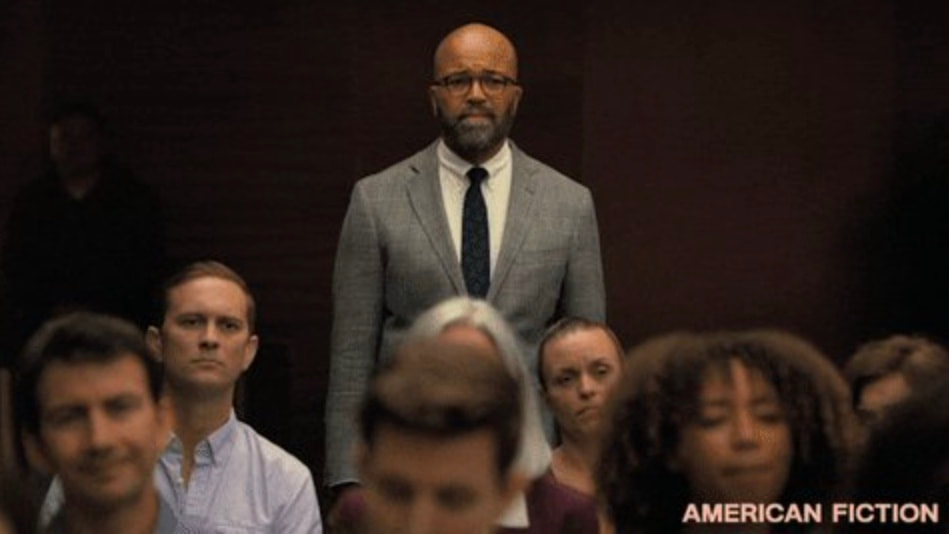|
After nearly two years of a global pandemic that deeply impacted our lives, we have collectively dug ourselves out, for the most part while also knowing on some level we will never be the same. The signs of the time, pre and post-pandemic were reflected in the movies and throughout the movie industry. All that to say, movies are back, baby! And some movies in 2023 actually got audience off of the couch and into theaters- thank you- Barbenheimer- although on some level it's clear that sooner-than-normal or straight-to -treaming may for a very long time, if not forever, be embedded in the system... especially for smaller films.
2023 will also be synonymous with the WGA and SAG strikes going well over 100 days. While it was debilitating for the industry, especially the members, a few significant releases got out just before the strikes, and even more once an agreement was reached. The fierce union negotiators managed to strike a deal with the studios, just in time release and promote the end-of-the-year Oscar contending movies. Here is my annual "Top Ten" Movies of 2023. These are in order of and a loving blending of my fav/best from #1 to #10. Hooray for Hollywood and go support in-theater movies when you can. 'Past Lives'- This is a great example of a pitch perfect film and of a debut filmmaker not over-reaching. This film is a wonderful blend of drama and little bit of romance while navigating themes of identity and culture. Go here for my full review - https://www.paulafarmer.com/film-blog/past-lives-film-review 'Monster'- This movie about perspective and context will have you pondering the themes and question for quite awhile after experiencing it. For my full review, go here - https://www.paulafarmer.com/film-blog/monster-movie-review 'Poor Things'- This is as quirky, creative and wild, yet substantive as any of the director Yorgos Lanthimos' earlier works ('The Favourite,' 'The Lobster'), if not more so. 'The Holdovers'- Although this is not necessarily one of Alexander Payne's masterpieces, like 'Sideways' and 'About Schmidt,' it is a quintessential Payne movie hitting all the hallmarks he is known for, like attention to detail, subtlety, perfect balance of drama and humor. It is both moving and delightful, and a must see for any fan of the filmmaker. The three main actors, Paul Giamatti, D'avine Joy Randolph and Dominic Sessa, give outstanding and believable performances. 'American Fiction' - Go to my full review here - https://www.paulafarmer.com/film-blog/american-fiction-review
0 Comments
Who is the monster in any highly-charged random scenario? In the case of Kore-eda Hirokazu's latest film, 'Monster,' it could be any one of us or none of us. Is it the bully at school or the new teacher who disciplines him? Maybe it’s the stoic school principal or an abusive single parent. Who can judge and who gets to exact revenge? 'Monster' ask these questions and more after tempers flare in a grade school class setting and an irrevocable series of events are unleashed. He explores how one incident can impact so many people’s lives, the power of perspective and the importance of context.
When a common classroom clash between two students- Yori and Minato- breaks out at a school in a small lakeside town, Minato is physically and emotionally impacted. By whom, why and how is not necessarily clear. Minato’s mother is convinced her son was hit by the disciplining teacher and vehemently takes the matter up with the principal, the teacher and other officials. She is dissatisfied with their initial offer of an official apology, and accuses the principal of being cold hearted and inhumane. To her, more must be done despite the revelation that the students, along with the teacher have differing claims about what exactly happened. Similar situations of classroom eruptions is probably replicated throughout schools everywhere everyday. This particular seemingly benign incident gradually mushrooms into so much more. Soon, the school board, the community and the media are involved, armed with opinions, criticisms and judgements. So sets the film’s premise which launches into a cascade of brilliantly executed points of view. As a viewer, you are guided into each character’s world outside of the specific incident, as well as getting a glimpse inside their personal trauma, drama and sometimes closely held beliefs and secrets. As such, you too make assumptions and think you’ve worked things out as far as who’s right and wrong; who is the victim and who are the perpetrators. But then a twist, a turn presenting an ever so slightly shift in perspective… although the characters remain the same. Every actor, every performance is utterly moving and effective, especially the two young leads, but the film’s stars are the editing by director, Kore-eda and the writing by Yuki Sakamoto. To take the viewers almost seamlessly from one point of view to the next without announcing the change and without confusing or losing us, is no small feat, and in the hands of a lesser talent, could have been a mind boggling disaster. Instead, “Monster,” which is drawing comparisons to Kurwosawa's "Rashomon," is tender and complex; smart and nuanced without being pretentious. As it unfolds, it gently nudges audience active participation by mentally putting together the cinematic puzzle laid out before them and navigate social constructs. “Monster” is not only one of the best movies of this year, but one of the best movies period. Director Kore-eda Hirokazu, known for previously critically acclaimed films “Shoplifters” and “The Brokers,” has just delivered his masterpiece. “American Fiction” is a hilarious must-see movie that delivers as many laughs as it does moments of poignancy. Jeffery Wright, most known as a prolific actor usually in supporting roles, is refreshingly the lead here. He stars as Monk, a California-based frustrated novelists-turned even more frustrated English professor. His books are good, not popular or profitable. While attending a writing conference in his hometown of Boston, he is painfully reminded of what he sees as the marginalized position of Black authors within literary circles. He is equal parts fed up with the publishing industry’s promotion of and its profits from books that perpetrate negative stereotypes. Monk is plagued with the nagging feeling that in order for him to achieve any financial success or professional notoriety, he must submit to the pervasive expectations- Black authors can only write Black stories full of trauma and drama.
All this angst leads to what he thought would be exacting revenge on the publishing industry. As such, he submits to Arthur, his agent (John Ortiz) a bogus, quickly thrown together mediocre novel brimming with what he considers blood curdling tropes- deadbeat dads, rappers and crack. Initially, Arthur was mortified and quick to discourage Monk from trying to make a social statement in the form of what could only be a failed experiment that could hurt his already lackluster writing career. But Monk is determined to go all in at rubbing their noses in their unfair system. He and Arthur agree to disagree and compromise by creating a pseudonym and fugitive, bad ass persona. To both their surprise and his agents delight, the manuscript illicit swift responses from the publishing world: Instead of outrage, a bidding war ensues. The white establishment not only does not register Monk’s intended point, but the winning publisher loves the book, fast tracks it to print and secures a movie deal. For better or worse, Monk and his alter ego- Stagg R. Leigh- is finally poised for success. All the while, Monk must maintain his new found literary persona and keep the publishing windfall a secret from everyone. Normally, Monk is known to maintain physical and emotional distance from his family, but while in town and his secret professional windfall is quickly unfolding, he is thrust into major family issues he cannot avoid. He finds himself in the caregiving role to his mother ( Leslie Uggams) that in times past was undertaken by his sister (Tracee Ellis Ross). Complicated by is mother’s declining health is the lack of support from his brother (Sterling K. Brown) in the matter, and a seemingly false start to a new romance. The family aspect of the movie wonderfully offer additional humor to the already hilarious take on the book world and society’s obsessions with stereotypes. Refreshingly and commendably Monk’s family and romance woes usher in a layer of complexity and humanity that is unexpected. Jeffrey Wright, long known for heavy-hitting dramatic roles like “Basquiat,” “Angels in America,” “The Ides of March,” just to name a very few, has of late been showcasing his comedic chops in movies such as “Game Night” and Wes Anderson films, like “French Dispatch” and “Asteroid City,” and we’re all better off for it. With “American Fiction” he wonderfully heads up this ensemble cast that includes Tracee Ellis Ross, Sterling K. Brown, John Ortiz and Erika Alexander. Wright does multiple one-on-one scenes with each of these actors, and you would be hard pressed to pick a favorite with each landing pitch perfect comedic and sometimes tender exchanges. “American Fiction” would work as a solidly good comedy, If there were only the one story/plot of Monk’s reluctant turn of events in his career and the circumstances leading up to it. The script-writing and cast are strong enough to deliver on the comedy front alone. This includes Sintara Golden (Issa Rae) as Monk’s author nemesis who is seemingly pandering to or victim of the narrow-minded establishment. The fact that debut writer-director Cord Jefferson, along with co-writer Percival Everett layered in a tender subplot of familial relations, love, loss and identity, is a bonus that takes the movie from just entertaining to exceptional. |
AuthorPaula Farmer. Archives
February 2024
Film |



 RSS Feed
RSS Feed